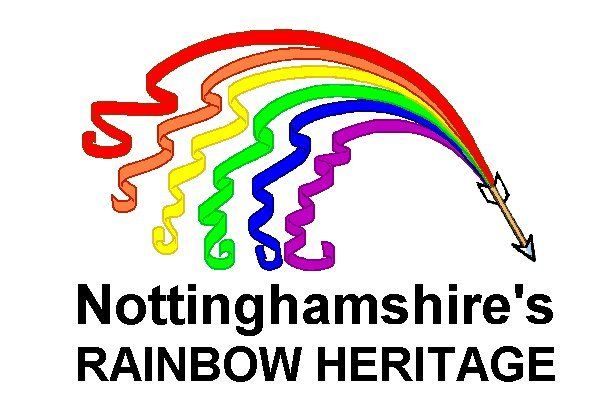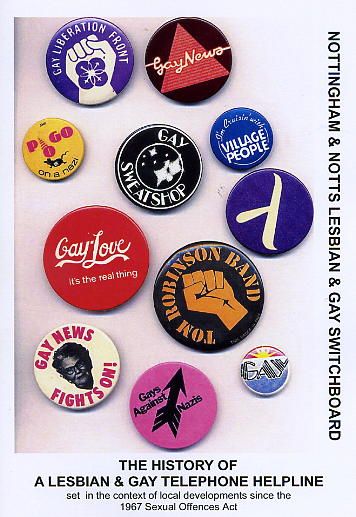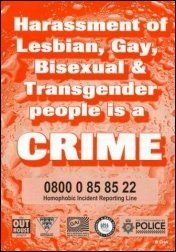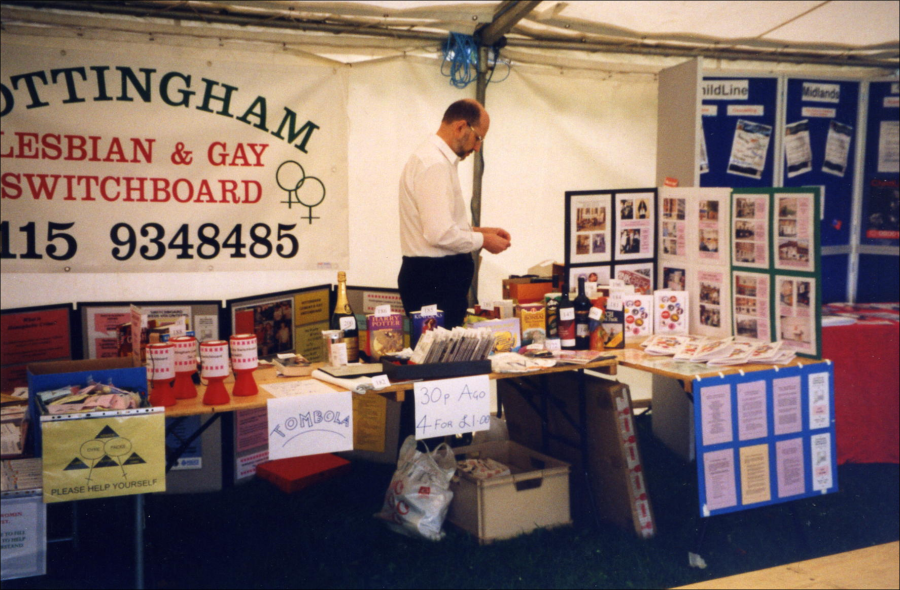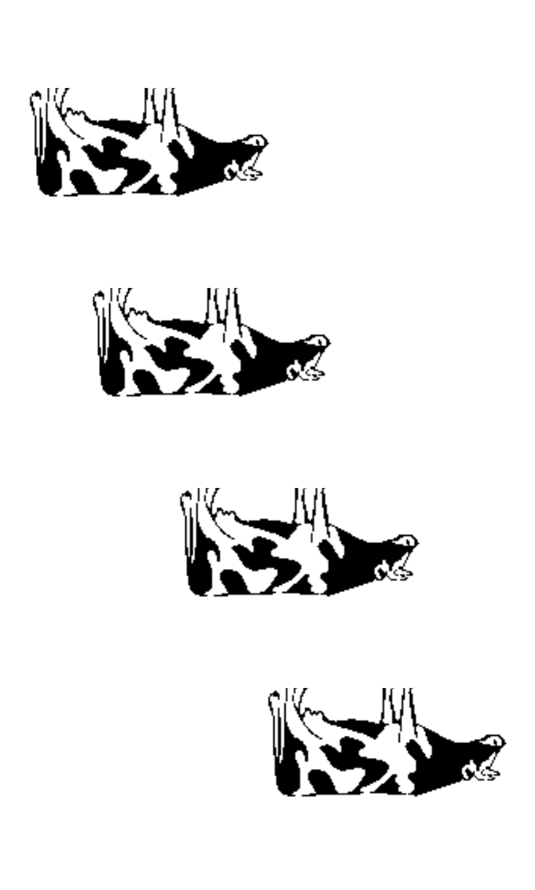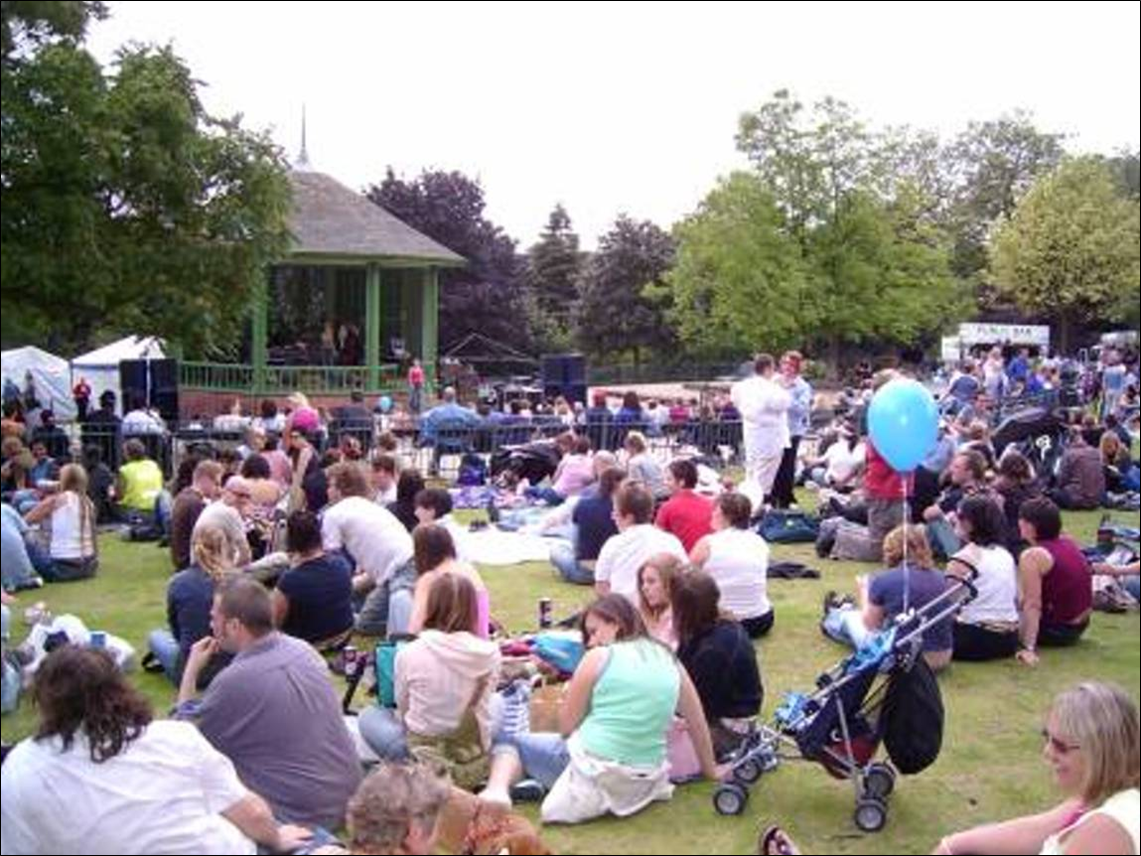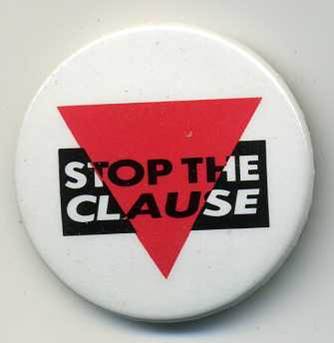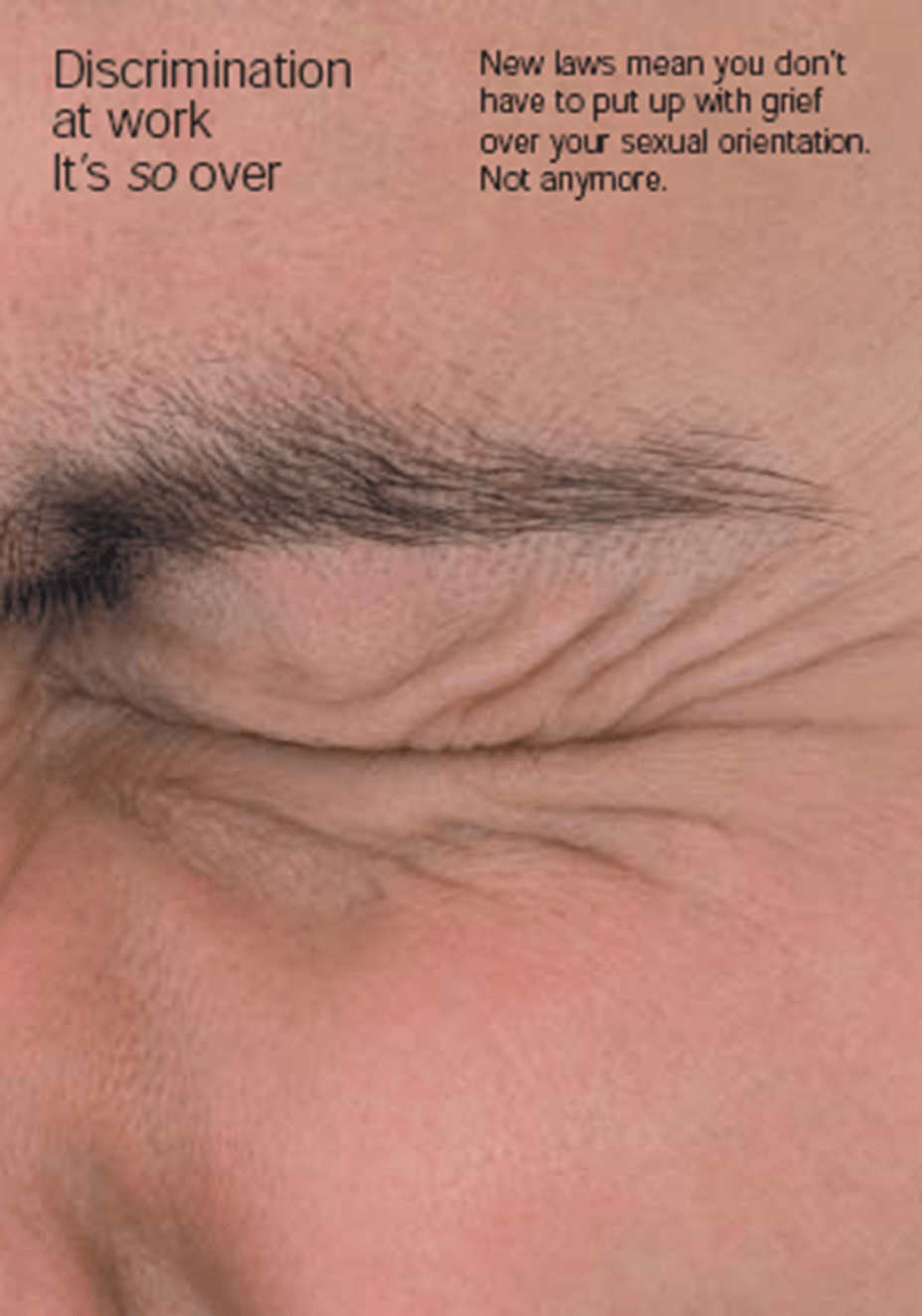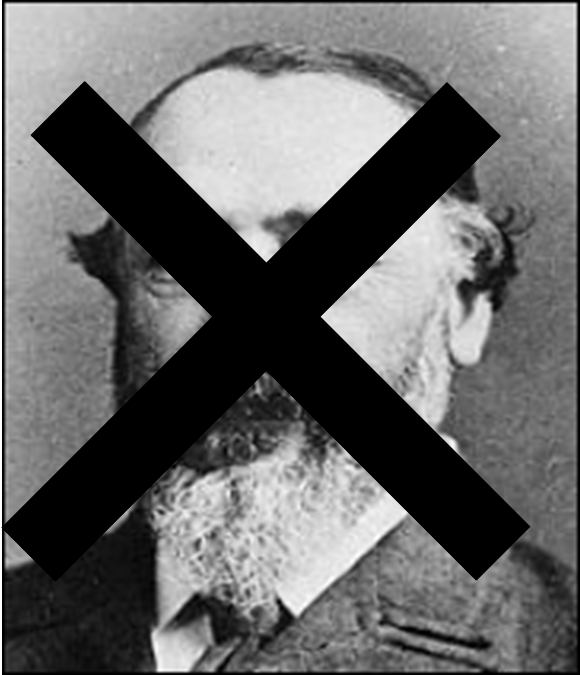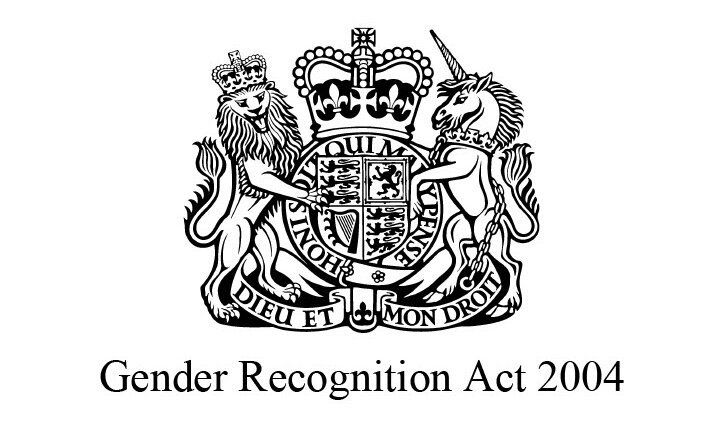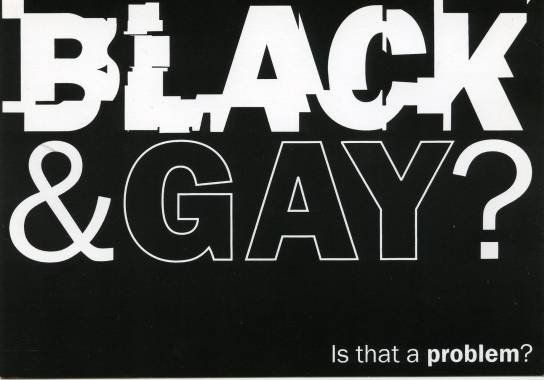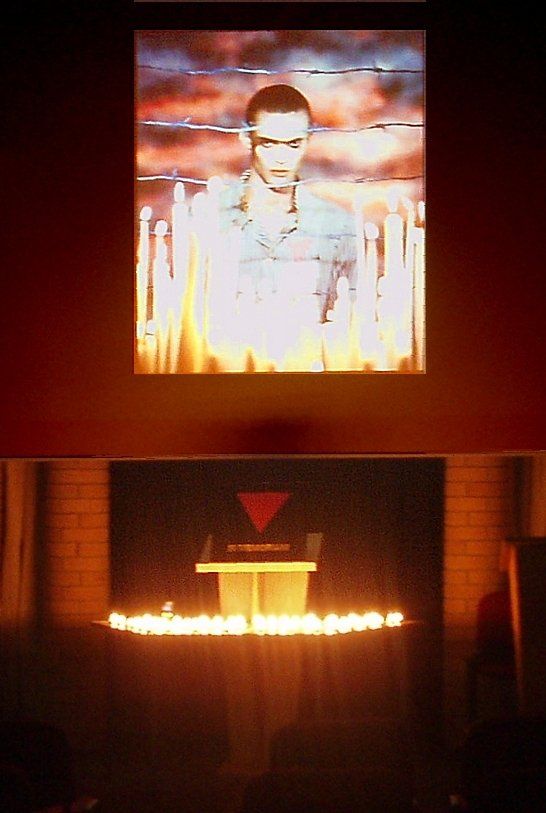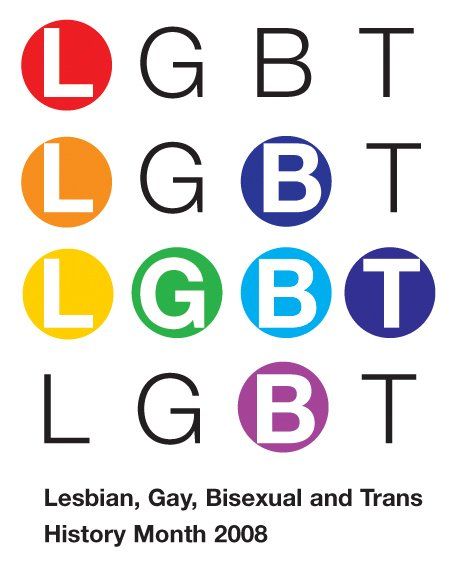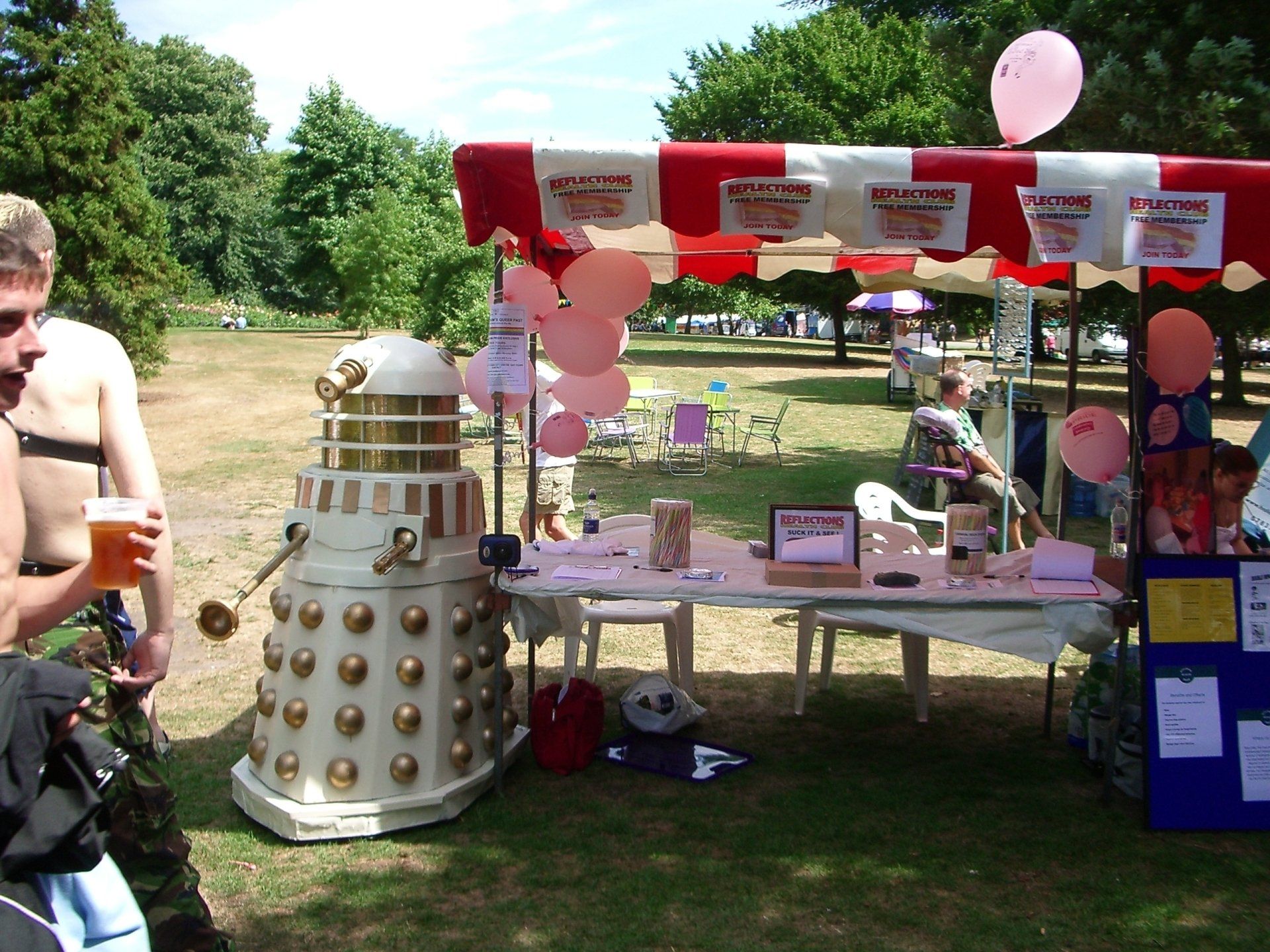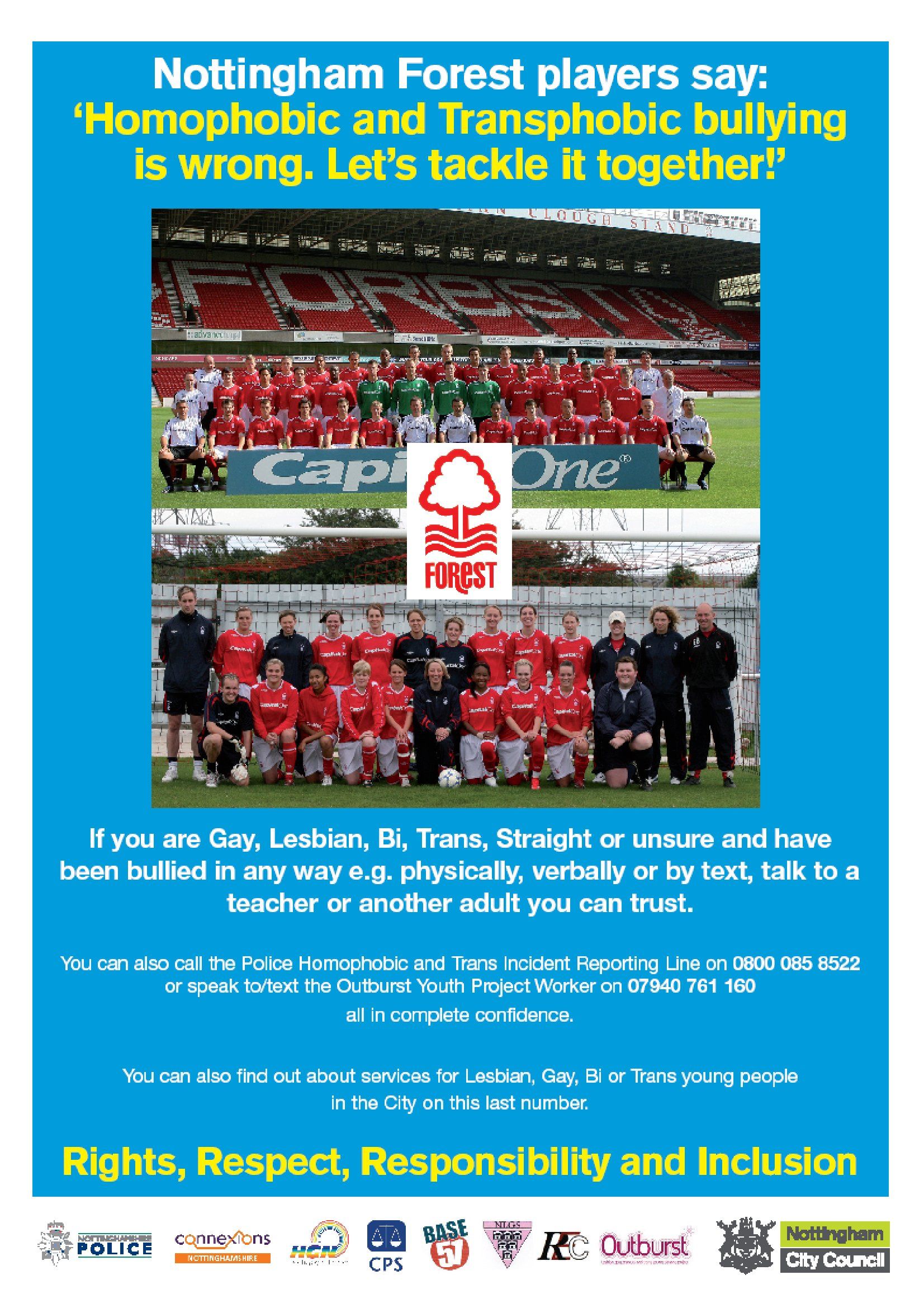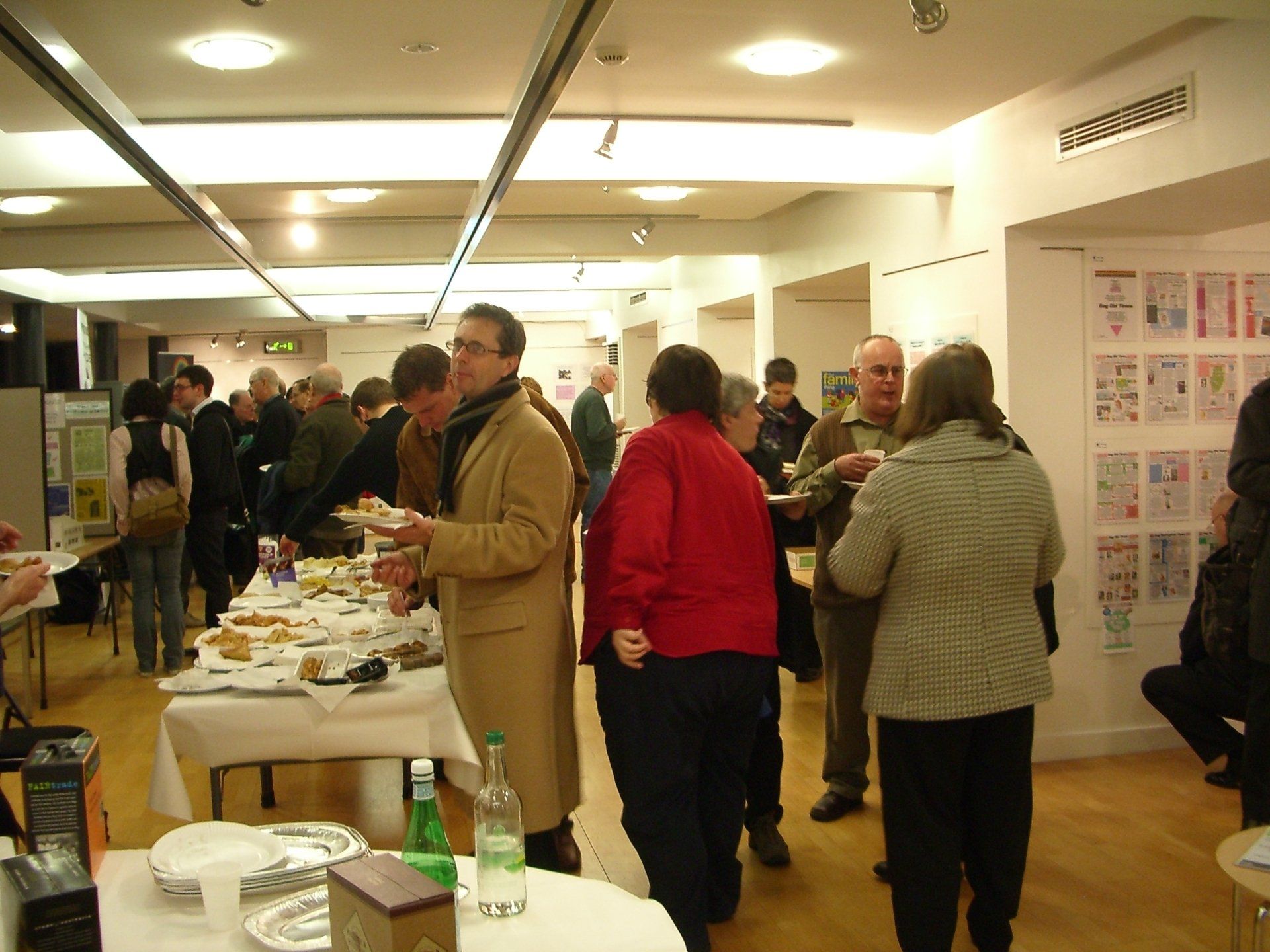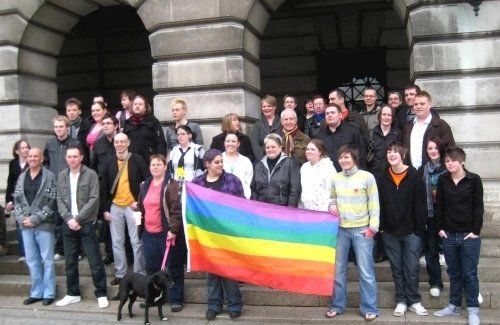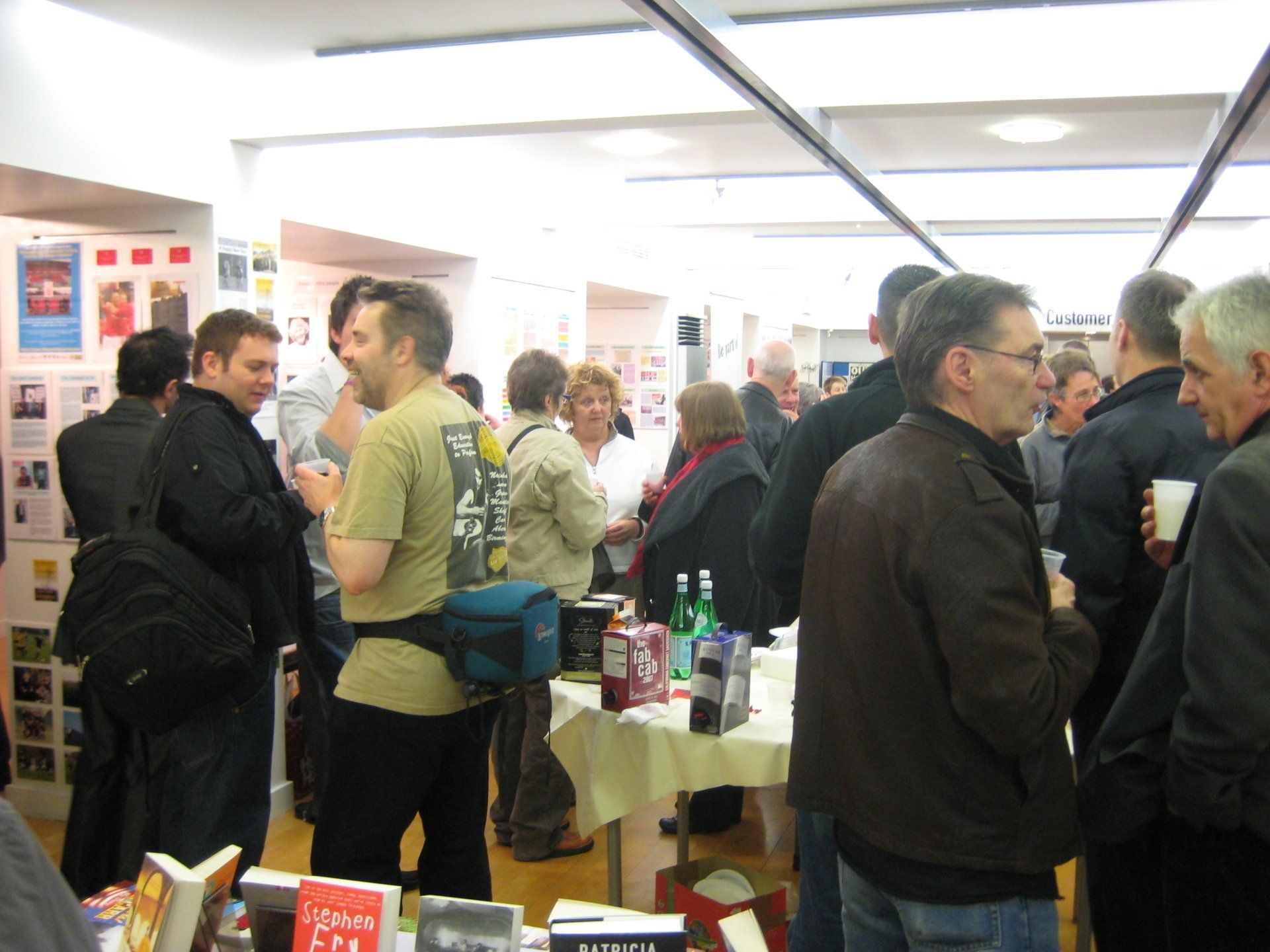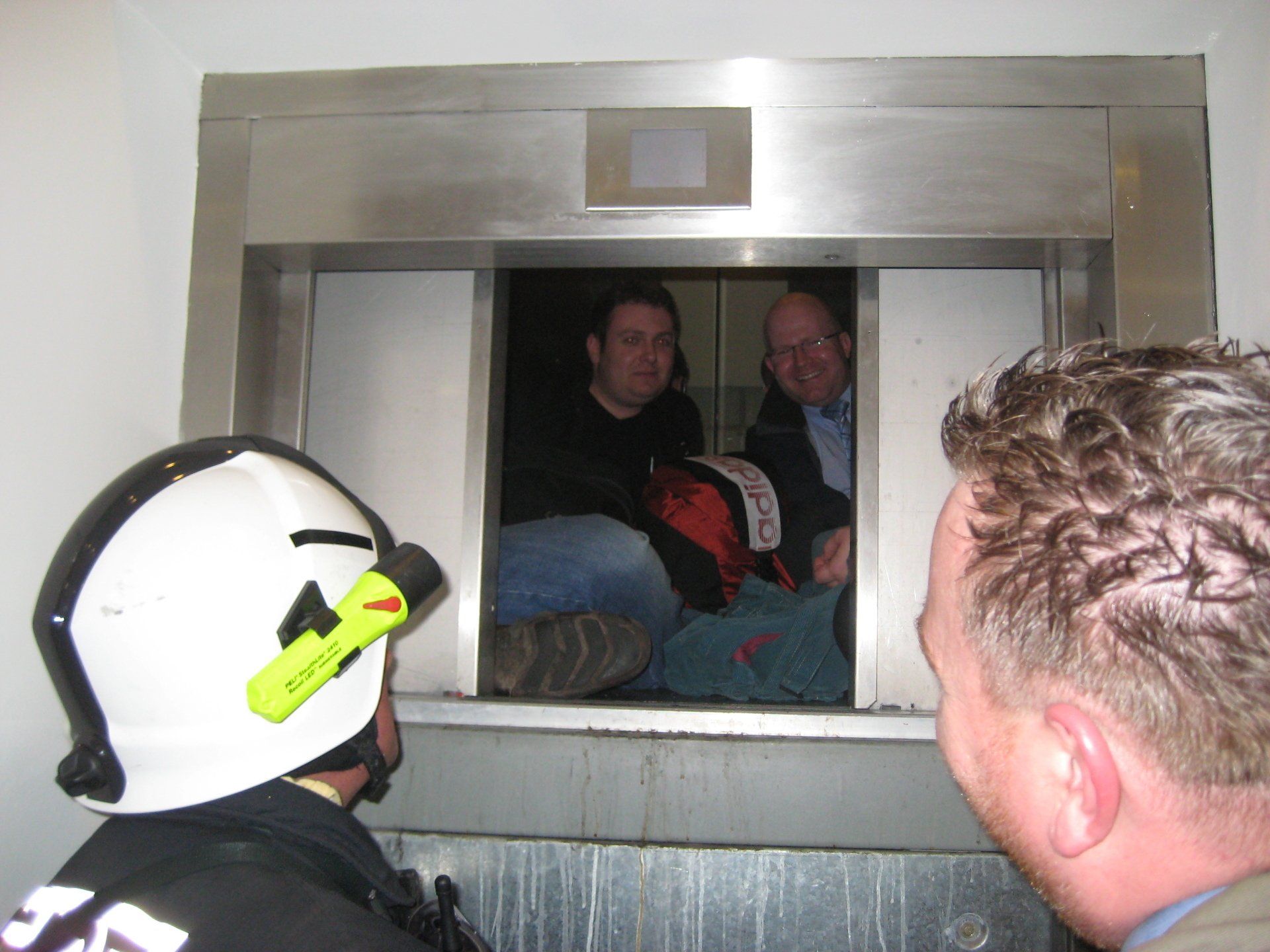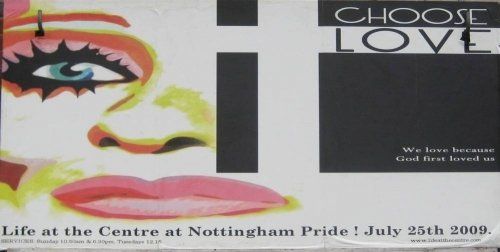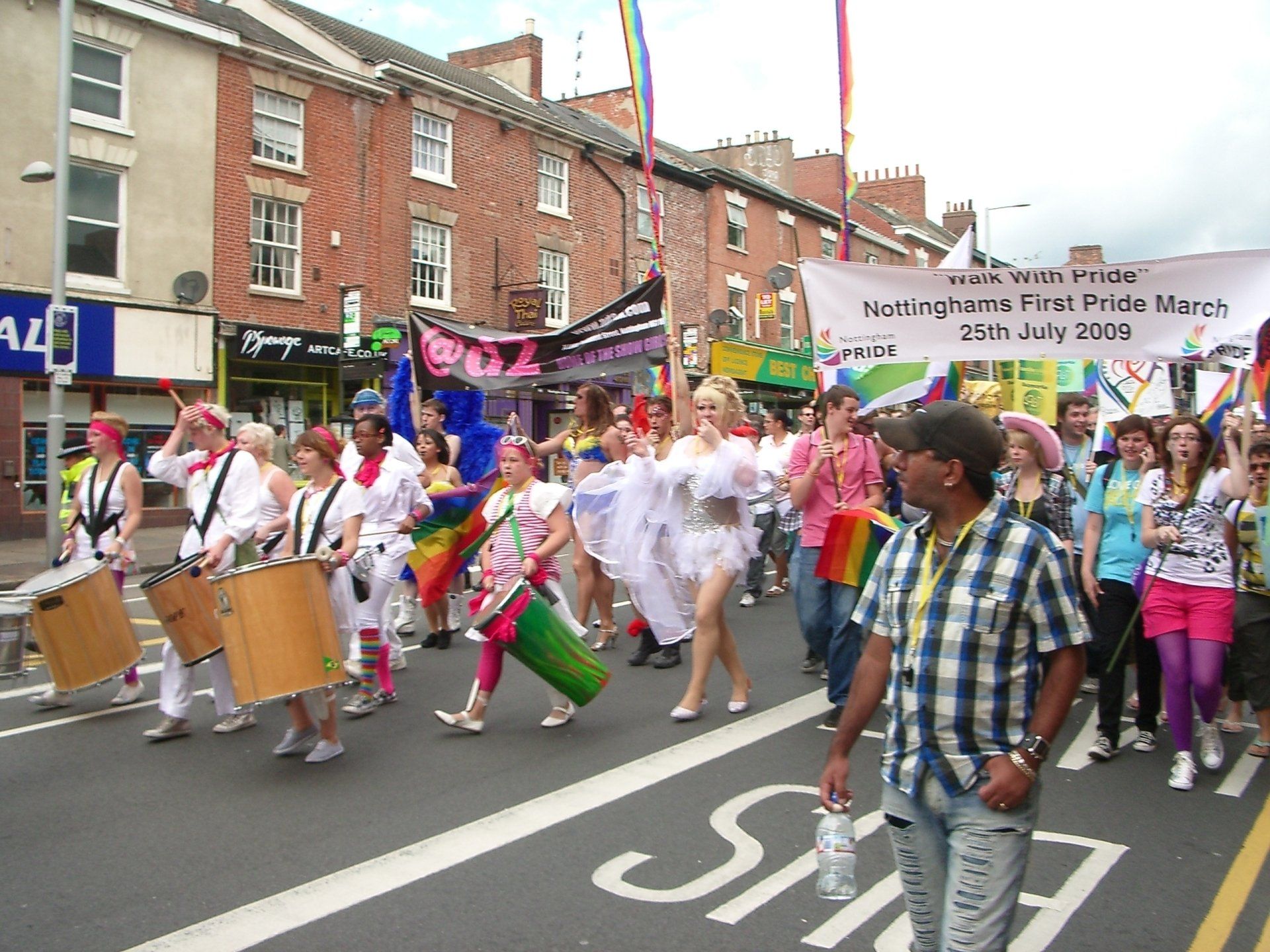In 2000, Nottinghamshire Living History Archives financed 90 local history projects. David Edgley, from Nottingham Switchboard, was awarded a project.
One of the outcomes of that project was a book on Nottingham's lesbian and gay history since 1967. It uses Switchboard and the organisations which preceded it as threads which tie the story together. The project also included 20 interviews with local LGBT people aged from 25 to 85 as well as a large number of photographs, many of which are used on this site.
The book's cover was simply a scanning of a set of badges owned by Roger Hollier.
To download a copy of the book, click HERE
To see our collection of LGBT badges (and some T shirts) click HERE
Nottinghamshire Police started serious involvement with the local LGBT community in the late 1990s. A Police LGBT Consultation group was set up and used to meet quarterly but at the moment is in abeyance.
One significant step was the introduction of an 0800 number for the reporting of non-emergency homophobic incidents. The line ran for about 9 years until it was the victim of financial cuts.
The people who took the calls were from the Hate Crimes team and were well versed in how to deal effectively with such calls. To hear someone talking about their experience of contacting Notts Police, click HERE
To find out more about our involvement with the Police,
click HERE
In 2001, after a long battle with the House of Lords, the government finally pushed through a change in the age of consent, bringing it down from 18 to 16 for gay men. It had been reduced from 21 to 18 in 1994.
The Moreton Christian Association said that the 2001 outbreak of foot and mouth disease was God's revenge for the lowering of the age of consent.
Buy why did God take it out on the cows? Should the RSPCA have been informed?
Nottingham Pride was revived in 2003 and moved to the Arboretum, which a lot of people thought was an ideal location.
The driving force behind the revival came from Biddy McMeel, who was working for the Outhouse and provided one positive outcome from that disappointing saga. She said that we should "think small, it will be like a village fete".
About 5000 people attended.
In November 2003, Section 28 was repealed.
In the period from 1988 to 2003 schools were one of the few areas where progress had gone into reverse. Homophobic bullying was rife. Later, conferences on tackling homophobic bullying in schools were organised in North Notts in 2004 and in Nottingham in November 2005.
It is an issue that schools are still struggling with.
People find it hard to believe that you could be sacked simply for being gay and lesbian, but there were many legal precedents, though things improved as more and more organisations included sexual orientation in their equality statements.
In December 2003 discrimination on the grounds of sexual orientation for employment was made illegal.
Religious organisations still have a get-out clause, so they can refuse to employ gay clergy, imams, rabbis …. and whatever the equivalent might be for Jedis.
Goodbye Labouchere.
In the 2003 Sexual Offences Act, the offence of "gross indecency" (The Labouchere Amendment) was removed from the statute books.
The law was put into operation in May 2004.
Despite that, there are still thousands of gay men who retain criminal records for something which is now no longer an offence. The criminal records are not automatically expunged. If they wish to apply for a job or voluntary work which requires a Disclosure and Barring check, their conviction will turn up.
The Gender Recognition Act was passed in 2004. It allows people who have gender dysphoria to change their legal gender. It came into effect on 4 April 2005.
A Gender Recognition Panel, including medical and legal experts considers evidence submitted to it to assess whether the criteria for issuing a Gender Recognition Certificate have been met. This includes having lived as your new gender for at least two years. The law does not recognise non-binary people.
In March 2005 Nottingham Switchboard (with invaluable help from Shirley Macredie) organised two conferences on "LGB issues in BME Communities". These were the first conferences of their type to be held in the UK.
About 60 people attended either as individuals or as representatives of a wide range of organisations. To read the related conferences documents and reports click HERE
On September 22nd 2005, a ceremony was held at the Holocaust Centre at Laxton. The purpose of the ceremony was to celebrate the donation of an LGB memorial plaque to the Holocaust centre and, at the same time, to remember the lesbians and gay men who died in the Holocaust.
About 45 people assembled to hear readings from the book “The men with the pink triangle”, by Heinz Heger. The ceremony ended with candles being lit by everyone present while the names were read out of countries where homosexuality is still punished by imprisonment or the death penalty; it was a long list.
The plaque is a simple square, bearing a pink triangle and the words “In Memoriam”.
Thanks must go to the North Notts LGB Development Group, and particularly to Mike Newstead of Bassetlaw CVS, for raising funds for the plaque and for organising the event.
To find out more about "the gay Holocaust", click HERE
In December 2005 Civil registration of partnerships begin. At last those "pretended" families had legal status. Several previous areas of legal discrimination for LGBT people rested on the fact that your relationship had no legal standing and you could not be "next of kin" to your partner.
As one of the participants in this picture said
"There's me, there's Roy my partner, there's my dad and there's Sammie the dog and we are a real family and a lot nicer than some of those fucking heterosexual families".
To see our display about Civil Partnerships click HERE
Designating February as LGBT History Month started in a small way the UK in 2005, but it was 2006 when it became a focus of activity in Nottingham.
Since 2006 we have had regular LGBT History quizzes, talks, films, seminars. We have organised exhibitions and displays at County Hall, the City Council House, Central Library, Broadway Cinema, Notts Police HQ and elsewhere
Both Universities and several colleges have put on a variety of events as have many other local organisations.
The National LGBT History Month website can be seen by clicking HERE
In 2004, 2005 and 2006, Nottingham Pride continued its residence in the Arboretum, with numbers increasing each year.
2006 was notable for an invasion of daleks.
As in all previous Prides held at the Arboretum, the weather was favourable. There are rumours that this is aided by the Pride Committee's ritual naked weather dance at midnight on Midsummer day
the 1970s most newspapers refused gay-related ads, but things began changing in the 1980s. We were surprised that the Newark Advertiser ("we are a family newspaper") still banned them in 2006.
In April 2007, the Goods and Services Act was broadened to include discrimination on the grounds of sexual orientation.
On May 1st 2007, the Newark Advertiser was phoned and asked to place 10 ads for Nottingham Lesbian and Gay Switchboard. They accepted the ads without argument. The law had changed and they knew it.
The volunteers who put together this history project spent months (with much help from the Heritage Lottery Fund) putting together an application form for a grant to launch Nottinghamshire's Rainbow Heritage.
The application was posted on Oct. 1st 2007. The grant was approved on Dec. 15th and the project officially started on Jan.15th 2008 - when we got the money!
In 2007, Nottingham City Council put together an anti-homophobic bullying pack which was sent to all City schools, colleges and youth groups.
In 2008, after several years of talks, they managed to persuade Nottingham Forest to lend their name and their players' pictures to an anti-homophobic bullying poster.
No other UK football club has - so far - been as upfront. As Forest was Justin Fashanu's team, this was particularly apposite. As this did not happen in London, the London gay media ignored it
On November 17th, Nottinghamshire County Council organised a large conference "Notts OUT", to examine homophobia in schools.
Nottinghamshire's Rainbow Heritage launched itself during February 2008's LGBT History Month with a very big exhibition at the View from the Top, which was a large gallery above what is now Waterstones.
The exhibition was attended, over the week, by over 700 people.
It also inaugurated the idea of presenting awards (just a framed certificate) to people, groups and organisations which have benefited the local LGBT community.
Nottinghamshire's Rainbow Heritage returned to the Room at the Top for a second LGBT History Month exhibition in February 2009. This one was, as they say, bigger and better. It was particular memorable for the incident when the lift broke down and Nottingham Fire and Rescue were called to remove those who were stuck.
he 2009 Nottingham Pride differed from previous Prides in that, for the first time, it was preceded by a march.
With traffic stopped by cooperation with the City Council and Notts Police, nearly 1000 people made their noisy way from the Forest Recreation Ground, down Mansfield Road, turning into Shakespeare Street and then up North Sherwood Street to the Arboretum.
The bystanders seemed to find the proceedings most enjoyable. As you will see below, the march was joined by a former Prime Minister keen to revive one of her most notorious pieces of legislation.
To go to the next Timeline click HERE
